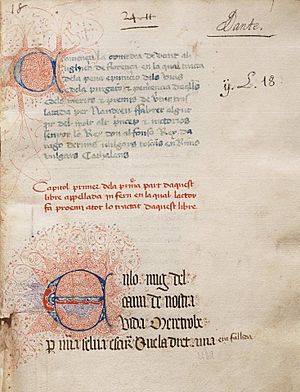Andreu Febrer facts for kids
Andreu Febrer i Callís (born between 1370 and 1374 – died between 1437 and 1444) was a brave Catalan soldier, a member of the royal court, and a talented poet. He is best known for being the first person to translate Dante Alighieri's famous poem, The Divine Comedy, into the Catalan language.
Contents
A Life of Service: Andreu Febrer's Journey
Andreu Febrer was born in Vic, a town in Catalonia, Spain. His family were skilled artisans. He started working for King John I of Aragon around 1393. After the king passed away, Andreu continued to serve the queen, Yolanda.
Serving Kings and Queens
In 1398, Andreu worked as a scribe, someone who copies documents, for King Martin the Humane. That same year, he joined the king's crusade in North Africa. Later, he served Martin I of Sicily, who was the King of Sicily, as a chamberlain. A chamberlain was an important official in the royal household.
Important Roles and Missions
In 1418, King Alfonso the Magnanimous made Andreu the castellan of Castello Ursino in Sicily. A castellan was the governor of a castle. The next year, in 1419, Andreu became an algutzir, which was like a bailiff or a law enforcement officer. In 1420, he took part in a war to invade Sardinia and Corsica.
After these military roles, Andreu served King Alfonso as a diplomat. This meant he traveled to other countries to represent the king and discuss important matters. Between 1429 and 1437, Andreu was in Barcelona. In 1437, he went to Naples leading a group of 100 crossbowmen, who were soldiers using crossbows. Records from 1444 show that he had passed away by then. At the time of his death, he held the respected rank of knight.
Andreu Febrer's Poetic Works
Andreu Febrer wrote beautiful lyric poetry in the Catalan language. Most of his poems seem to have been written before the year 1400. Fifteen poems believed to be by him are found in an old collection called the Cançoner Vega-Aguiló.
Types of Poems He Wrote
His poems include a sirventes, which was a type of medieval poem that often criticized society or politics. He also wrote a Crusade song about the military trip he took in 1398. Andreu wrote two praise poems for important ladies: one for the ladies of the court of the County of Cardona and another for the Queen of Sicily, who was probably Maria.
He also wrote eleven love poems. These poems were addressed to a mysterious lady he called Na Beatriu, which means 'Lady Beatrice'. He used secret names for her, like Loindan' Amor (Distant Love) and Passabeutats (Beauty Beyond Compare). Andreu's style was inspired by famous poets called troubadours, like Arnaut Daniel and Jaufre Rudel. His Catalan language sometimes sounded old-fashioned and included words from Old Occitan.
Translating Dante's Divine Comedy
One of Andreu's most important achievements was his translation of Dante Alighieri's famous poem, Divine Comedy. In 1429, in Barcelona, Andreu translated this long poem into Catalan. He kept the original poem's special rhyming style called terza rima.
Andreu's translation was the very first time The Divine Comedy was put into verse in another language. Another translation into Spanish had been published a year earlier, but it was in prose (like regular writing), not poetry. Andreu's work was highly praised by important people, including the Marqués de Santillana. Andreu dedicated his translation to King Alfonso the Magnanimous. Today, only one copy of his translation still exists. It is kept in a library at El Escorial.
See also
 In Spanish: Andreu Febrer para niños
In Spanish: Andreu Febrer para niños
 | Isaac Myers |
 | D. Hamilton Jackson |
 | A. Philip Randolph |


